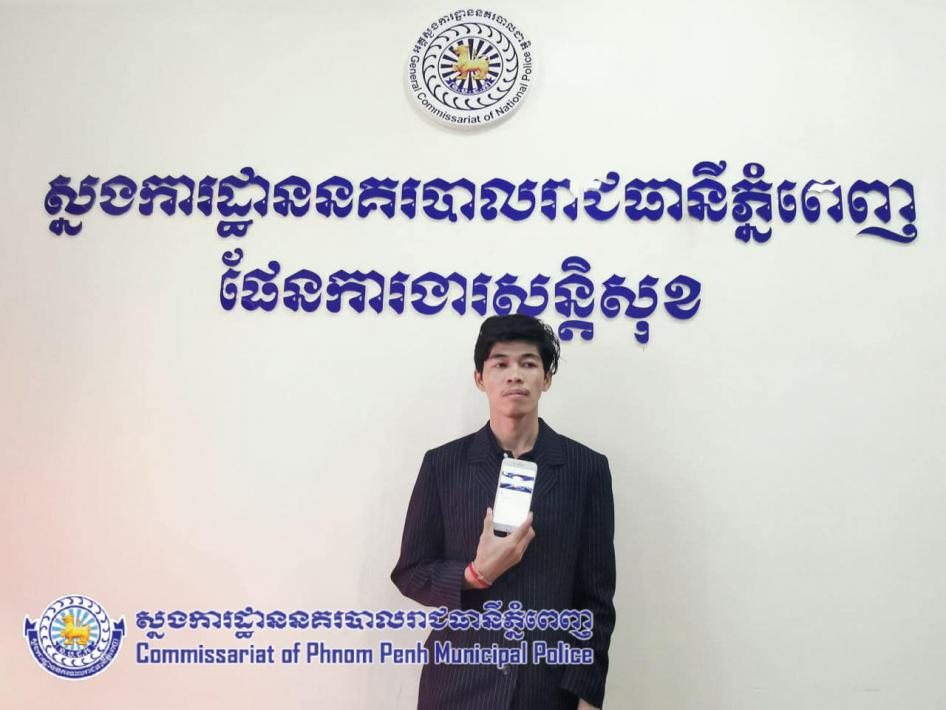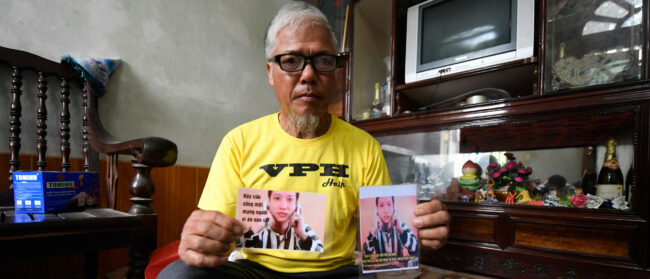Human rights organisations have slammed the arrest of a Cambodian journalist who was charged with criminal incitement after posting a quote from Prime Minister Hun Sen to his personal Facebook page.
Rithy’s arrest is part of a Southeast Asia-wide trend that has emerged as governments have enacted closer control over their press in the wake of the global pandemic.
Sovann Rithy, a reporter and publisher of the TVFB social media news platform, was arrested on 8 April after publishing a direct quote from the prime minister suggesting motorbike taxis could sell their vehicles to make their livelihood during the economic downturn caused by the Covid-19 pandemic.

“If motorbike-taxi drivers go bankrupt, sell your motorbikes for spending money. The government does not have the ability to help”, Rithy quoted Hun Sen as saying at a Tuesday press conference. National police later argued the prime minister had been joking, but did not dispute he had said the words in question. The same line was quoted online by other Cambodian journalists who watched the press conference, at least one of whom wrote Hun Sen had twice made the statement in question.
Daniel Bastard, head of Asia-Pacific Desk for Reporters Without Borders (RSF) told the Globe that the arrest is part of a “clearly very worrying trend”.
“We see many governments have passed some decrees or laws under the pretext of combating false information or ‘fake news’ in order to impose some very draconian legislation.”
At issue is a lack of any strict definition of what is considered false information, meaning governments are at liberty to decide what is true and what is not.
“Information they are not happy with would be deemed false information and they can very naturally censor it, even if it’s ultimately in the public interest,” Bastard said.
Sar Theth, chief of the Phnom Penh Municipal Police, said officers arrested Rithy on a charge of violating Article 495 of the criminal code, alleging the journalist had taken the prime minister’s statement out of context to engage in “incitement to cause chaos and harm social security”. Rithy was detained and sent Wednesday to the Phnom Penh municipal court for questioning.
The charge against Rithy can carry a prison sentence of 6-24 months and fines of 1-4 million Cambodian riel (approximately $250-1,000USD).
Cambodian authorities revoked TVFB’s media license before any criminal charges were filed against Rithy. His publication’s web presence was later pulled down.
Cambodian Centre for Human Rights (CCHR) executive director Chak Sopheap said Rithy’s arrest and indictment violates the fundamental right of freedom of expression. Sopheap believes the criminal case against him will have “chilling repercussions” for media freedom across Cambodia.
Sopheap said it’s unclear how Rithy’s repetition of the statement could provoke criminal activity any more than the original comments made by Hun Sen.
“The potential impact of this case is concerning, not only for Rithy who has been arbitrarily arrested but more broadly for the damage this case could do to freedom of expression and free media across the country”, she said. “This case illustrates the government’s brazen efforts to stifle freedom of expression and operate outside of international human rights standards.”
Human Rights Watch (HRW) deputy Asia director Phil Robertson issued a statement calling the charges “bogus” and urged the Cambodian authorities to release Rithy and others detained for expressing their online opinions about Covid-19.
“Even in Hun Sen’s Cambodia, arresting a journalist for quoting the prime minister marks a new low for press freedom,” Robertson stated.
The [Myanmar] government is using the pretext of combatting Covid-19 fake news to impose its own narrative on what is happening in Rakhine State and censor any information they are not happy with, especially coming from the Arakan Army
Daniel Bastard, Reporters Without Borders
The Cambodian government has recently come under fire for arresting numerous people, including political dissidents, for spreading what they deem “fake news” about the outbreak of the novel coronavirus. As of 9 April, HRW has documented 23 arrests, with eight of those jailed having direct links with the opposition Cambodian National Rescue Party (CNRP), which was dissolved in 2018.
‘Worrying trend’ in Southeast Asia
Rithy’s arrest has sent ripples of fear for democracy not only across Cambodia but across Southeast Asia as governments have tightened free press under the pretext of stopping the spread of “false” coronavirus reporting.
On 26 March, as part of a decree imposing a state of emergency, Thailand passed legislation stating any information about the virus they consider “false or capable of spreading fear” could carry a five-year prison sentence. Even people making jokes in Thailand relating to Coronavirus on April Fools Day could face five years in jail under the legislation.
Amidst the coronavirus crisis when the flow of information is critical, the Myanmar government has blocked access to 221 news sites they deem as sharing false information about the pandemic.
RSF has described the ban as disturbingly authoritarian, with Bastard flagging the move as the clearest example where a government is using the cover of the coronavirus to squash dissent.
“The [Myanmar] government is using the pretext of combatting Covid-19 fake news to impose its own narrative on what is happening in Rakhine State and censor any information they are not happy with, especially coming from the Arakan Army,” he explained. While the Myanmar government has not released a list of the banned sites, local news sources have reported that some are prominent media outlets for the country’s ethnic minority groups.
In the Philippines, a journalism student was arrested and forced to give a public apology after he made a Facebook post questioning what he saw as the inaction of President Rodrigo Duterte regarding Covid-19. Two other journalists in the Philippines are also facing criminal charges that could land them two months prison for allegedly spreading false news about the coronavirus.
Referring to recent reports of China concealing the extent of the initial coronavirus outbreak in Wuhan city, Bastard speculated whether a free press could have mitigated the spread of the virus.
“Journalists would have alerted the world, the [World Health Organisation] and so it’s very worrying that this terrible crisis is used by governments to censor journalists and to impose their own version of the situation.”
He cautioned that, without any governmental transparency, discerning the actual amount of cases and deaths is near impossible and therefore has a profound impact on how the world deals with the crisis.
“It is really hard to find reliable, trustworthy information in Southeast Asia regarding this and it is criminal if the spread of the disease is hidden,” Bastard said.


